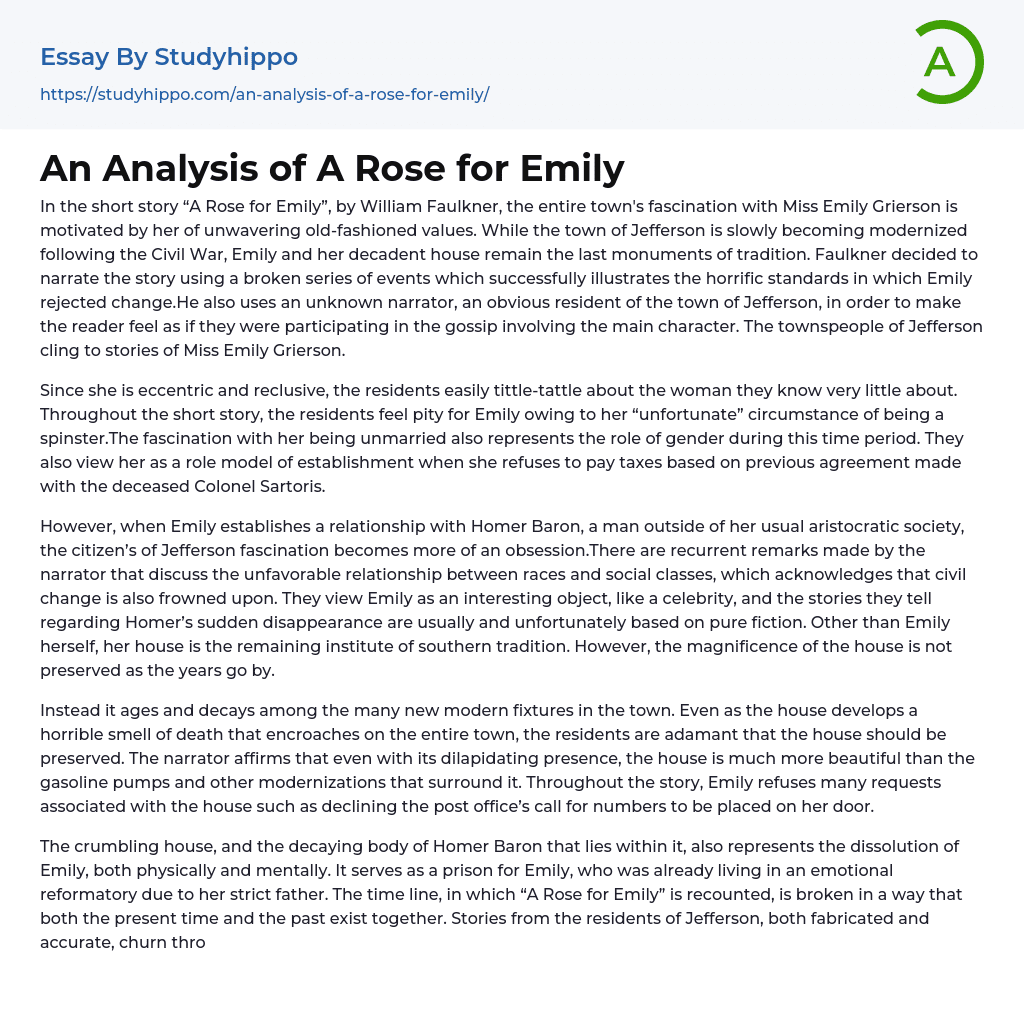In the short story “A Rose for Emily”, by William Faulkner, the entire town's fascination with Miss Emily Grierson is motivated by her of unwavering old-fashioned values. While the town of Jefferson is slowly becoming modernized following the Civil War, Emily and her decadent house remain the last monuments of tradition. Faulkner decided to narrate the story using a broken series of events which successfully illustrates the horrific standards in which Emily rejected change.He also uses an unknown narrator, an obvious resident of the town of Jefferson, in order to make the reader feel as if they were participating in the gossip involving the main character. The townspeople of Jefferson cling to stories of Miss Emily Grierson.
Since she is eccentric and reclusive, the residents easily tittle-tattle about the woman they know very little about. Throughout the short story, the residen
...ts feel pity for Emily owing to her “unfortunate” circumstance of being a spinster.The fascination with her being unmarried also represents the role of gender during this time period. They also view her as a role model of establishment when she refuses to pay taxes based on previous agreement made with the deceased Colonel Sartoris.
However, when Emily establishes a relationship with Homer Baron, a man outside of her usual aristocratic society, the citizen’s of Jefferson fascination becomes more of an obsession.There are recurrent remarks made by the narrator that discuss the unfavorable relationship between races and social classes, which acknowledges that civil change is also frowned upon. They view Emily as an interesting object, like a celebrity, and the stories they tell regarding Homer’s sudden disappearance are usually and unfortunately based on pure fiction. Other tha
Emily herself, her house is the remaining institute of southern tradition. However, the magnificence of the house is not preserved as the years go by.
Instead it ages and decays among the many new modern fixtures in the town. Even as the house develops a horrible smell of death that encroaches on the entire town, the residents are adamant that the house should be preserved. The narrator affirms that even with its dilapidating presence, the house is much more beautiful than the gasoline pumps and other modernizations that surround it. Throughout the story, Emily refuses many requests associated with the house such as declining the post office’s call for numbers to be placed on her door.
The crumbling house, and the decaying body of Homer Baron that lies within it, also represents the dissolution of Emily, both physically and mentally. It serves as a prison for Emily, who was already living in an emotional reformatory due to her strict father. The time line, in which “A Rose for Emily” is recounted, is broken in a way that both the present time and the past exist together. Stories from the residents of Jefferson, both fabricated and accurate, churn throughout the narrative during different parts of the main character’s life.Faulkner is brilliant by using flashbacks and foreshadowing devices. The non-chronological order of events creates anticipation and nervousness for the reader.
This allows the reader to draw conclusions from the events as they unfold and develop their own ideas about what will occur at the end of the story. It also allows the reader to feel like a resident of Jefferson by becoming an avid listener to the gossip. For example,
Emily’s purchase of arsenic has the audience speculating if she will commit a murder and who her victim will be.If the events of the story were written in chronological order, it would take away from the reader’s enthrallment in the story. Faulkner also wants the reader to identify with the fascination of the town in Emily's loneliness, eccentricity, and the frightening discovery after her death. The title of this short story, “A Rose for Emily’, is the first and final indication that the main character does not embrace change.
There is no mention of a rose in this short story, however, it is common to preserve a rose by drying it out.The town’s interest in Miss Emily Grierson displays its need to grasp onto the last remaining southern traditions. With the horrifying discovery of Homer’s body and possibility of necrophilia after Emily passes away, the reader is left wondering what happens to the town. With the last remaining traditional staples succumbing to death and revealing murder, will the residents of Jefferson embrace change and modernization? The lesson that William Faulkner presents to his audience is that it is necessary to accept change otherwise it can lead to one’s demise.
- Book Summary essays
- Metaphor essays
- Reader essays
- Rhyme essays
- Literary devices essays
- Villain essays
- Books essays
- Genre essays
- Literary Criticism essays
- Writer essays
- Protagonist essays
- Simile essays
- Poem essays
- Book Report essays
- Book Review essays
- Greek Mythology essays
- Plot essays
- Tragic Hero essays
- Coming of Age essays
- Play essays
- Rhetoric essays
- Rhetorical Question essays
- Translation essays
- Understanding essays
- Reason essays
- Character essays
- Letter essays
- American Literature essays
- Literature Review essays
- Utopia essays
- Poetry Analysis essays
- Dante's Inferno essays
- Between The World and Me essays
- Incidents in The Life of a Slave Girl essays
- Flowers for Algernon essays
- Myth essays
- Everyday Use essays
- Boo Radley essays
- Genesis essays
- Richard iii essays
- Alice in Wonderland essays
- On the road essays
- Ozymandias essays
- The Nightingale essays
- Holden Caulfield essays
- Animal Farm essays
- 1984 essays
- A Hanging essays
- Shooting An Elephant essays
- A Tale Of Two Cities essays




